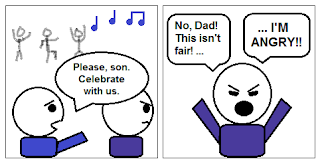In the last few verses of The Parable of the Prodigal Son, the older son and the father speak about the younger (and “prodigal”) son who has just returned home.
Now his elder son was in the field. As he came near to the house, he heard music and dancing. He called one of the servants to him, and asked what was going on. He said to him, “Your brother has come, and your father has killed the fattened calf, because he has received him back safe and healthy.” But he was angry, and would not go in. Therefore his father came out, and begged him. But he answered his father, “Behold, these many years I have served you, and I never disobeyed a commandment of yours, but you never gave me a goat, that I might celebrate with my friends. But when this, your son, came, who has devoured your living with prostitutes, you killed the fattened calf for him.”
He said to him, “Son, you are always with me, and all that is mine is yours. But it was appropriate to celebrate and be glad, for this, your brother, was dead, and is alive again. He was lost, and is found.” (Luke 15:25–32)
As a child do you remember taking the position that you were being treated unfairly? That a bratty younger sibling or maybe a bratty classmate was receiving the treatment you felt you deserved? Or maybe as an adult you've experienced something similar, a lazy coworker received accolades while you went unnoticed for all your steady hard work. How did these situations make you feel? A world-famous artist captured this perfectly, I think, in the masterpiece below. [NOTE: By “A world-famous artist,” “captured this perfectly,” and “masterpiece” I actually just mean “I,” “tried to draw this,” and “doodle,” respectively.]
You felt angry, right? I know I did. It also made me feel small and unappreciated and like I wasn't special. Unfortunately for parents, it's hard to respond to a child who feels slighted and approaches the subject angrily, especially when the child blames the parent; the natural reaction to being blamed for doing something you don't believe is wrong is to become defensive. Maybe you've heard some of these responses before:
- “Well, I've got news for you: Life isn't fair.”
- “I don't want to hear another word. Go to your room!”
- “Why you ungrateful little….”
Do these responses really assuage your anger? Do they help you understand the situation a little better, help you come out of yourself enough to see the situation for what it is and not only how it makes you feel? The first response suggests that, Guess what, kid, you'll be feeling this way all your life. So deal with it. Perhaps life isn't fair, but does that proverb comfort the child and help him understand that he is still wanted and accepted? Does it teach him that others are also wanted and accepted? Probably not. The second response outright dismisses the child's feelings, leaving him to work them out on his own. The takeaway from this would probably be It doesn't matter what I feel because no one listens to me. Also not very helpful. The third response is a case of fighting fire with fire. The child approaches the situation angrily and the parent snaps back angrily. Accusations fly: The parent is being unfair and the child is being ungrateful. This response only makes the child feel worse about the whole situation.
The Father in Jesus's parable handles the interaction with his older son thoughtfully. He listens to his son as he expresses how the situation makes him feel. Instead of being caught up in his own emotional reaction, the Father does not condemn the older son's feelings, but he affirms his relationship with his older son. The Father acknowledges that this son will always be with him and all that he has belongs to him also. To me this is an image of comfort as he quiets the anger of his older child. There is a lesson for the older son to learn in this experience too. It was good for the Father to celebrate and be glad that his younger son had returned home. The Father's reaction was not about which son he liked more; it only had to do with the safe return of his younger son. Without dismissing his older son's feelings, the Father tried to help the older son understand the situation for what it was and not only how it made him feel. What an understanding, patient, and sensitive heavenly Father we have! For in the intensity of our feelings, whether they are just or not, he holds us close to him and will not dismiss us.
Scripture quoted from the World English Bible. The World English Bible is in the Public Domain. That means that it is not copyrighted. See copyright information here: https://www.biblegateway.com/versions/World-English-Bible-WEB/#copy.
.png)